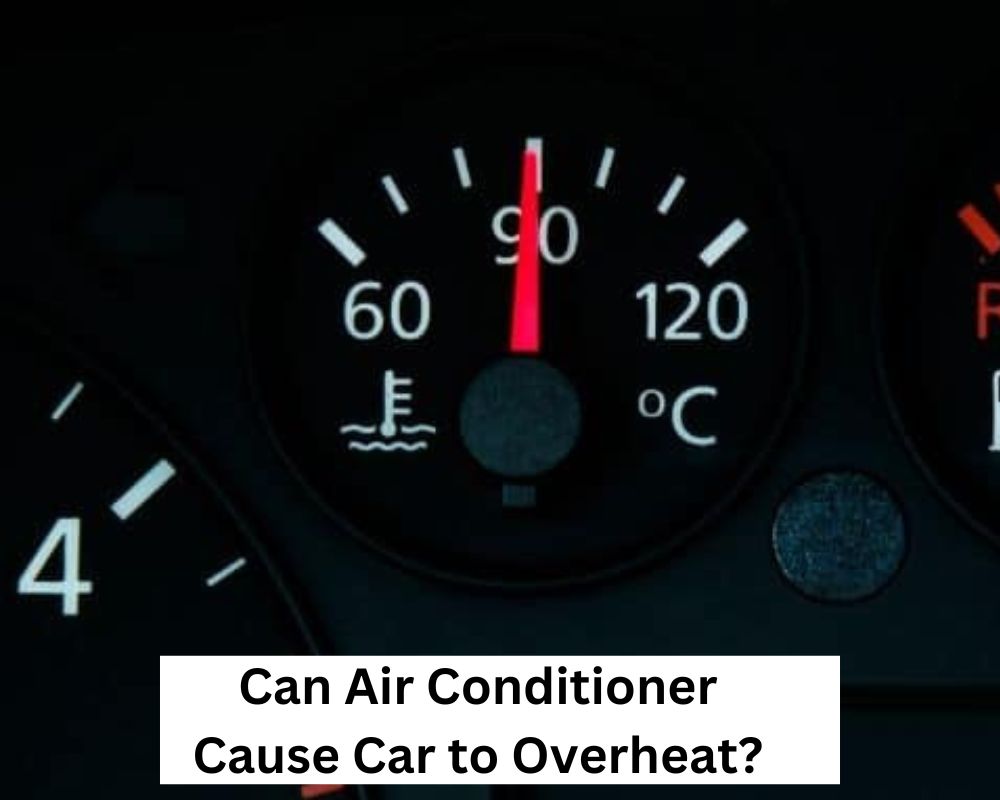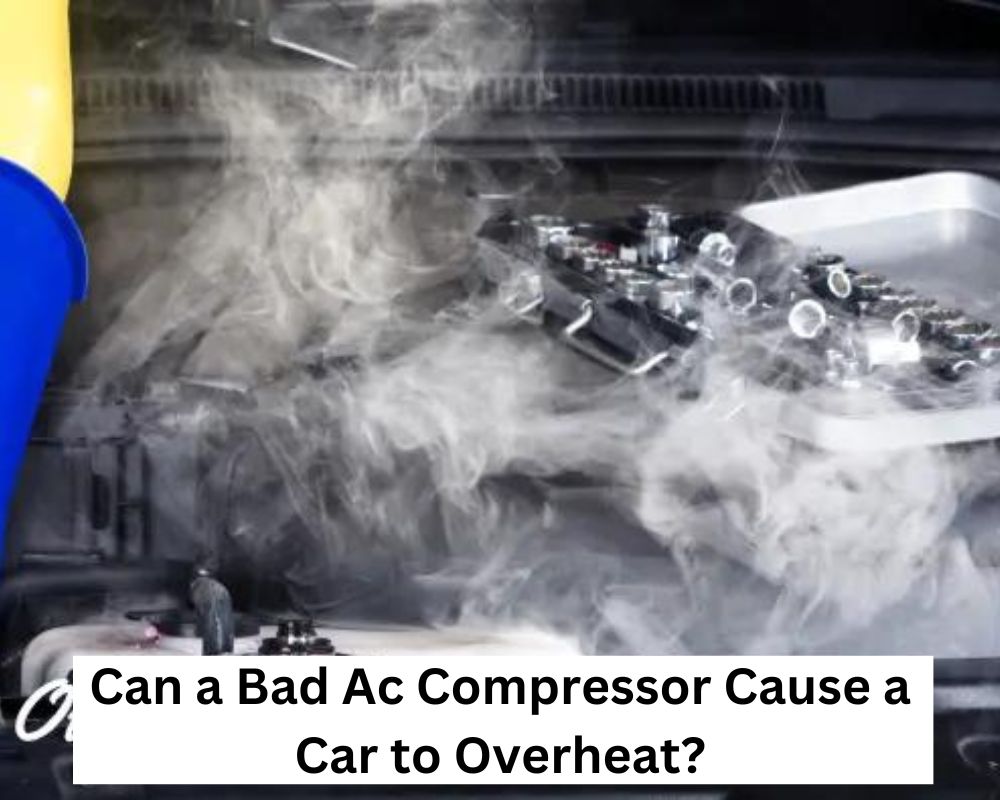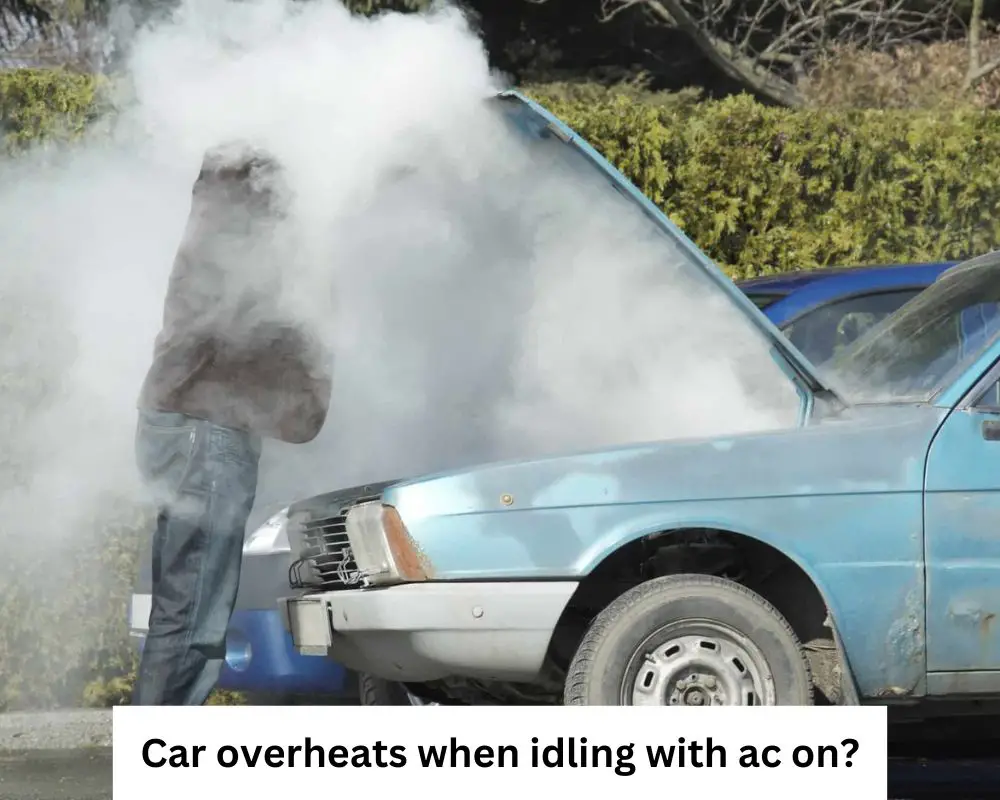It’s hot outside and you’re trying to cool off in your car. But, is it possible that your air conditioner could be causing your car to overheat? Here’s what you need to know about how air conditioners can impact your car’s engine temperature and what you can do to stay cool while driving this summer.
Car overheating is a common problem during hot weather, and one of the potential causes is your air conditioner. While it may seem counterintuitive, using your AC can actually lead to your car overheating. Here’s how it works: when you turn on your AC, it puts a strain on your engine.

This strain can cause your engine to work harder than usual, which in turn can lead to overheating. Additionally, the cold air from the AC can lower the temperature of your engine coolant, making it less effective at keeping your engine cool. So if you’re driving in hot weather, be sure to keep an eye on your temperature gauge.
If you see it starting to creep up, turn off your AC for a bit and open your windows instead. This will help relieve some of the strain on your engine and allow it to cool down. Of course, this isn’t the only reason why cars overheat – other potential causes include low coolant levels, a faulty radiator fan, or even something as simple as clogged air filters.
But if you’re noticing that your car tends to overheat when you use the AC, be sure to take some preventative measures to avoid any further damage to your vehicle.
Can a Bad Ac Compressor Cause a Car to Overheat?

Overheating is a common problem with car AC compressors. The compressor puts a lot of strain on the engine, and if it’s not working properly, it can cause the engine to overheat. There are a few things that can cause a compressor to go bad, and if your car is overheating, it’s important to check the compressor first.
If your compressor is leaking oil, that’s one sign that it’s going bad. Oil helps keep the compressor cool, so if it’s leaking, the compressor will start to overheat. Another sign of a bad compressor is strange noises coming from under the hood.
If you hear squealing or grinding when you turn on the AC, that could be a sign that the bearings in the compressor are going bad. If your car is overheating and you suspect the AC compressor might be to blame, take it to a mechanic for a diagnosis. They’ll be able to tell for sure if the compressor is causing problems and they can also fix it or replace it if necessary.
Why is My Car Overheating With the Ac On?
If your car is overheating with the AC on, there are a few potential causes. The most common cause is a low coolant level. If the coolant level is low, it won’t be able to do its job of keeping the engine cool, and the engine will overheat.
Another potential cause is a problem with the AC compressor. If the compressor isn’t working properly, it can put extra strain on the engine, causing it to overheat.
Finally, if the cooling fans aren’t working properly, they won’t be able to keep the engine cool when the AC is on.
If you’re not sure what’s causing your car to overheat with the AC on, take it to a mechanic for diagnosis and repair.
Does Ac Cause Overheating?
There are a few different ways that air conditioning can cause your car to overheat. The most common way is if the AC is turned on while the car is idling. This can cause the engine to work harder than it needs to, which in turn can lead to overheating.
Another way AC can cause overheating is if the compressor isn’t working properly. If the compressor isn’t circulating enough coolant, it can cause the engine to overheat.
Finally, if there’s a leak in the AC system, it can allow hot air from outside to enter the car, which will also cause the engine to overheat.
Car overheats when idling with ac on?

When a car overheats while idling with the air conditioning (AC) on, it can be attributed to increased engine load and reduced airflow through the radiator. When the AC is running, it places extra strain on the engine as it powers the compressor, which generates heat.
During idling, the engine’s RPM (revolutions per minute) is relatively low, resulting in less efficient cooling of the engine and radiator. As a result, the combination of the AC load and reduced airflow can cause the engine temperature to rise rapidly, leading to overheating.
Regular maintenance, such as ensuring proper coolant levels, checking for coolant leaks, and keeping the radiator and cooling system clean, can help prevent such issues and maintain optimal engine performance.
If the problem persists, it is advisable to have the vehicle inspected by a qualified mechanic to identify any underlying mechanical issues.
Does Ac Affect Engine Temperature?
It’s a common misconception that running the air conditioner in your car will make the engine run hotter. In reality, however, the AC has very little impact on engine temperature. The AC compressor is driven by the engine, so it does use some power and can add to the load on the engine.
However, it’s a relatively small amount of power compared to what the engine is capable of producing. The compressor also helps to circulate coolant through the radiator, which helps keep the engine cool.
So while there may be a slight increase in engine temperature when the AC is turned on, it’s not enough to cause any significant problems or overheating.
Car Overheating When Ac is on And Idling
If your car overheats when the AC is on and idling, there are a few potential causes. The most common cause is a low coolant level. If the coolant level is low, it needs to be topped off.
Another potential cause is a clogged radiator. A clogged radiator can prevent coolant from circulating properly, causing the engine to overheat.
Finally, a failing water pump can also cause this problem. When the water pump isn’t working properly, it won’t be able to circulate coolant through the system, leading to an overheated engine.
When your car is overheating when the AC is on and idling, check the coolant level first. If it’s low, top it off and see if that fixes the problem.
If not, then you’ll need to check for a clogged radiator or failing water pump.
Temperature Gauge Goes Up When Air Conditioner is on
When you have your air conditioner running, you may notice that your temperature gauge goes up. This is normal and not cause for alarm. Your air conditioner is working to cool down your car, and as it does so, the engine has to work harder.
This increased workload causes the engine to generate more heat, which is reflected in the temperature gauge. If you are concerned about your car overheating, make sure to keep an eye on the other gauges in addition to the temperature gauge. The oil pressure and voltmeter gauges will give you a better indication of how well your engine is doing under the increased load.
As long as those gauges stay within their normal ranges, there’s no need to worry about your car overheating from running the air conditioner.
Car Overheats When Ac Is Turned on. Fix Finds
Can a Bad Ac Compressor Cause Car to Overheat?
A car’s air conditioning system cools and dehumidifies the air inside the vehicle by cycling refrigerant through a closed loop. This process requires quite a bit of energy, which is provided by the compressor. If the compressor is not working properly, it can cause the car to overheat.
There are several potential causes of a malfunctioning compressor. One possibility is that the drive belt that powers the compressor has slipped or broken. Another possibility is that there is a leak in the system, allowing refrigerant to escape.
Either of these issues can prevent the compressor from providing enough cooling power, causing the car to overheat. If your car’s air conditioning system isn’t working properly, have it checked by a qualified mechanic as soon as possible?
In some cases, a simple repair can fix the problem and keep your car running cool all summer long!
What Causes Overheating When Ac is On?

If your AC is on and it’s overheating, there are a few potential causes. One possibility is that the air filter is dirty and needs to be replaced. Another possibility is that the coils inside the AC unit are frozen.
This can happen if the temperature outside is too cold or if the AC unit isn’t getting enough airflow. If the coils are frozen, they won’t be able to properly cool the air, which will cause the unit to overheat. Finally, another potential cause of an overheating AC unit is a malfunctioning thermostat.
If the thermostat isn’t working properly, it may not be sending signals to the AC unit indicating when to turn on and off. This can also lead to an overheating issue.
Conclusion
If your car has been overheating, and you can’t figure out why, it could be because of your air conditioner. That’s right – the A/C in your car can actually cause your engine to overheat. It happens when the compressor puts extra strain on the engine, causing it to work harder and heat up.
So, if you’re having trouble with your car overheating, turn off the A/C and see if that helps.